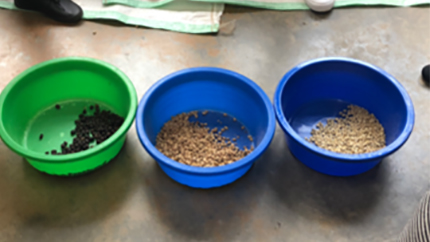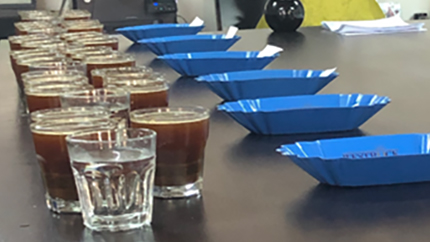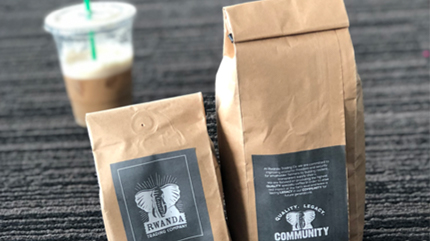Note: The University of Nebraska–Lincoln's Water for Food Global SEEDS student learning community, hosted by the Daugherty Water for Food Global Institute, is focused on professional development in entrepreneurship, agriculture and sustainable development. As part of their studies, students visited Rwanda in Summer 2019 to research agriculture entrepreneurship models. The following is one of several guest posts from students' about their experiences.
From Bean to Brew

What’s the first thing you think of when you wake up in the morning? Honestly, for me, it’s probably to snooze the alarm and to go back to sleep for a few minutes. But after that? Must. Have. Coffee. Like many my age (especially college students), coffee is a normal part of our daily routine. It’s wound into our American culture. But do we ever stop to think about where our coffee comes from? Maybe we grabbed our favorite roast from Starbucks or the local grocery store, but where does the story really begin? For many, our journey begins in East Africa, in the small country of Rwanda.
The Daily Grind at RTC: Improving and Increasing
Rwanda Trading Company (RTC) was founded, like any good entrepreneurial idea, around a problem and the need for a solution. They saw a need in the supply chain to connect smallholder farmers to buyers and roasters. Supply chain logistics are a real problem for farmers all over the country, who struggle endlessly to find a way to get their product to a buyer or the market. In order to fill this gap, RTC has 1) built relationships with these smallholder farmers and 2) provided them with capital and other resources. In order to build relationships, they first learn about farmers in the industry who are willing to learn and grow. RTC’s field agents visit farmers and help connect them to RTC. But the connection doesn’t stop there. The agents provide continuous trainings with farmers, going into their fields and teaching them how to have a more profitable crop. They provide agronomic training to farmers to help them increase yields. In just four years of these extra trainings, farmers saw existing trees go from producing 1.5 kilograms (kg) of coffee to 6 kg per tree, a massive increase.

RTC has been able to increase profitability for farmers through their washing stations and partners there. When the coffee crop is fully washed, its quality is increased by 70%. RTC has built and operates 17 washing stations and supports 40 other existing ones. Here, they provide opportunities and training for farmers station personnel on product quality in order to have a higher quality product and return a greater profit. It’s quite remarkable to see how education of farmers in
In order to be sustainable, these smallholder farmers also receive capital and resources from RTC. Whether this be financing farmers to buy crops from other farmers, or providing coffee seedlings to them, there are many opportunities for RTC to support their farmers. They not only seek out potentially profitable coffee crop farms, but are also giving those farmers resources to grow their businesses and farms. While in the end, these practices ultimately benefit RTC and their profitability, they are changing the way these people farm and increasing their quality of life.
While the works of RTC are prominent in the field, their part in the supply chain doesn’t end there. They ensure that the best quality product possible is offered into the market. After washing, beans are collected and brought to the RTC office in Kigali, Rwanda. Here, the beans are further washed, sorted by grade, and quality tested. Careful note is taken as to where the coffee came from and who grew it. Sample batches are roasted, ground, and brewed in order to test the quality that may be received by the consumer. If the coffee passes quality control, the beans are bagged and shipped off to their respective buyers and suppliers. While it may seem like an arduous process, each step ensures that the customer is receiving the best product possible.

RTC has the future in mind as they continue to improve their business. They are constantly looking for innovative farmers who are excited to produce a quality coffee crop. They are also finding ways to reduce waste from coffee processing, such as using the cherry byproducts from the washing stations that would be discarded with decomposers to form compost as an organic fertilizer for their coffee trees. They also closely monitor their product quality in order to attain certain certifications that allow them an all-access pass into some high-quality markets, such as to Starbucks. No matter what step of the line or time of year or day, the folks at Rwanda Trading Company are always striving for excellence through innovation.
Cultivating a Coffee Culture: The Next Steps
While this operation has created huge waves of success, there are still a few challenges to overcome. One in particular is being able to combat the current culture surrounding domestic coffee consumption. In Rwanda, tea is the preferred drink of choice, and a good cup of coffee is hard to come by (which is quite troubling to my need for caffeine). It is just not enjoyed by many Rwandans. In fact, only 3% of coffee produced here is consumed domestically. Coffee is seen as a drink for foreigners and a status symbol. This belief stems from the colonial beginnings of coffee cropping in Rwanda. Around a century ago, coffee was forcefully introduced to Rwandan farmers by the Belgian government in order to boost their own economy at the expense of these farmers. Because of this, coffee is not socially accepted within their culture and represents an overpowering with wealth.
Until recently, coffee shops were scarce within the country. But coffee companies and producers like RTC are producing quality beans and grounds ready for domestic consumption. They provide great coffee at a great price so that those in surrounding communities are able to get their hands on affordable and delicious coffee. While the product is available, its capacity for adoption by Rwandans is all in the mindset. Coffee producers can encourage others to accept and promote the upcoming coffee culture through not only educating the farmers on how to provide a quality product, but also allowing the general public to have a phenomenal coffee experience.
Setting the (Coffee) Bar

Overall, it was a great experience to discuss how a business found a simple, yet effective, solution to a huge problem to the benefit of others. RTC is definitely centered around the success of farmers and is providing them huge resources to be able to be successful. Not only are they providing high-quality coffee (which I am so excited to bring home and share with my roommates and family), but they also set an example for what a successful enterprise can look like. Their simple logistical solution can create massive improvements in the lives of farmers, families, and communities — a win-win for both farmer and business. I think their community-centered mindset is going to make waves within the country and the coffee industry.


